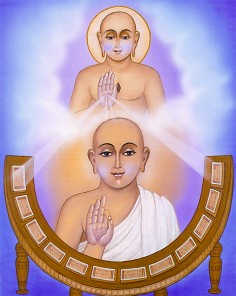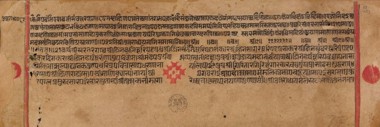Tenth Lecture: [1] The Leaf of the Tree
As the fallow leaf of the tree falls to the ground, when its days are gone, even so the life of men (will come to its close); Gautama, be careful all the while! (1)
As a dew-drop dangling on the top of a blade of Kuśa-grass lasts but a short time, even so the life of men; Gautama, be careful all the while! (2)
As life is so fleet and existence so precarious, wipe off the sins you ever committed; Gautama, be careful all the while! (3)
A rare chance, in the long course of time, is human birth for a living being; hard are the consequences of actions; Gautama, be careful all the while! (4)
When the soul has once got into an earth-body,[2] it may remain in the same state as long as an Asaṃkhya;[3] Gautama, be careful all the while! (5)
When the soul has once got into a water-body, it may remain in the same state as long as an Asaṃkhya; Gautama, be careful all the while! (6)
When a soul has once got into a fire-body, it may remain in the same state as long as an Asaṃkhya; Gautama, be careful all the while! (7)
When the soul has once got into a wind-body, it may remain in the same state as long as an Asaṃkhya; Gautama, be careful all the while! (8)
When the soul has once got into a vegetable-body, it remains long in that state, for an endless time, after which its lot is not much bettered;[4] Gautama, be careful all the while! (9)
When the soul has once got into a body of a Dvīndriya (i.e. a being possessing two organs of sense), it may remain in the same state as long as a period called saṃkhyēya;[5] Gautama, be careful all the while! (10)
When the soul has once got into a body of a Trīndriya (i.e. a being possessing three organs of sense), it may remain in the same state as long as a period called saṃkhyēya; Gautama, be careful all the while! (11)
When the soul has once got into a body of a Chaturindriya (i.e. a being possessing four organs of sense), it may remain in the same state as long as a period called saṃkhyēya; Gautama, be careful all the while! (12)
When the soul has once got into a body of a Pañchēndriya (i.e. a being possessing five organs of sense), it may remain in the same state as long as seven or eight births; Gautama, be careful all the while! (13)
When the soul has once got into the body of a god or of a denizen of hell, it may remain in that state one whole life; Gautama, be careful all the while! (14)
Thus the soul which suffers for its carelessness, is driven about in the Saṃsāra by its good and bad Karman; Gautama, be careful all the while! (15)
Though one be born as a man, it is a rare chance to become an ārya; for many are the Dasyus and Mlēcchas; Gautama, be careful all the while! (16)
Though one be born as an ārya, it is a rare chance to possess all five organs of sense; for we see many who lack one organ or other; Gautama, be careful all the while! (17)
Though he may possess all five organs of sense, still it is a rare chance to be instructed in the best Law; for people follow heretical teachers; Gautama, be careful all the while! (18)
Though he may have been instructed in the right Law, still it is a rare chance to believe in it; for many people are heretics; Gautama, be careful all the while! (19)
Though one believe in the Law, he will rarely practise it; for people are engrossed by pleasures; Gautama, be careful all the while! (20)
When your body grows old, and your hair turns white, the power of your ears decreases; Gautama, be careful all the while! (21)
When your body grows old, and your hair turns white, the power of your eyes decreases; Gautama, be careful all the while! (22)
When your body grows old, and your hair turns white, the power of your nose decreases. (23)
When your body grows old, and your hair turns white, the power of your tongue decreases. (24)
When your body grows old, and your hair turns white, the power of your touch decreases. (25)
When your body grows old, and your hair turns white, all your powers decrease. (26)
Despondency, the king’s evil, cholera, mortal diseases of many kinds befall you; your body wastes and decays; Gautama, be careful all the while! (27)
Cast aside from you all attachments, as the(leaves of) a lotus let drop off the autumnal[6] water, exempt from every attachment, Gautama, be careful all the while! (28)
Give up your wealth and your wife; you have entered the state of the houseless; do not, as it were, return to your vomit; Gautama, be careful all the while! (29)
Leave your friends and relations, the large fortune you have amassed; do not desire them a second time; Gautama, be careful all the while! (30)
There is now no Jina,[7] but there is a highly esteemed guide to show the way; now being on the right path, Gautama, be careful all the while! (31)
Now you have entered on the path from which the thorns have been cleared, the great path; walk in the right path; Gautama, etc. (32)
Do not get into an uneven road like a weak burden-bearer; for you will repent of it afterwards; Gautama, be careful all the while! (33)
You have crossed the great ocean; why do you halt so near the shore? make haste to get on the other side; Gautama, be careful all the while! (34)
Going through the same religious practices as perfected saints,[8] you will reach the world of perfection, Gautama, where there is safety and perfect happiness; Gautama, be careful all the while! (35)
The enlightened[9] and liberated monk should control himself, whether he be in a village or a town, and he should preach to all[10] the road of peace; Gautama, be careful all the while! (36)
Having heard the Buddha’s[11] well-delivered sermon, adorned by illustrations, Gautama cut off love and hatred and reached perfection. (37) Thus I say.
 Ganadhar Sudharma Swami
Ganadhar Sudharma Swami
